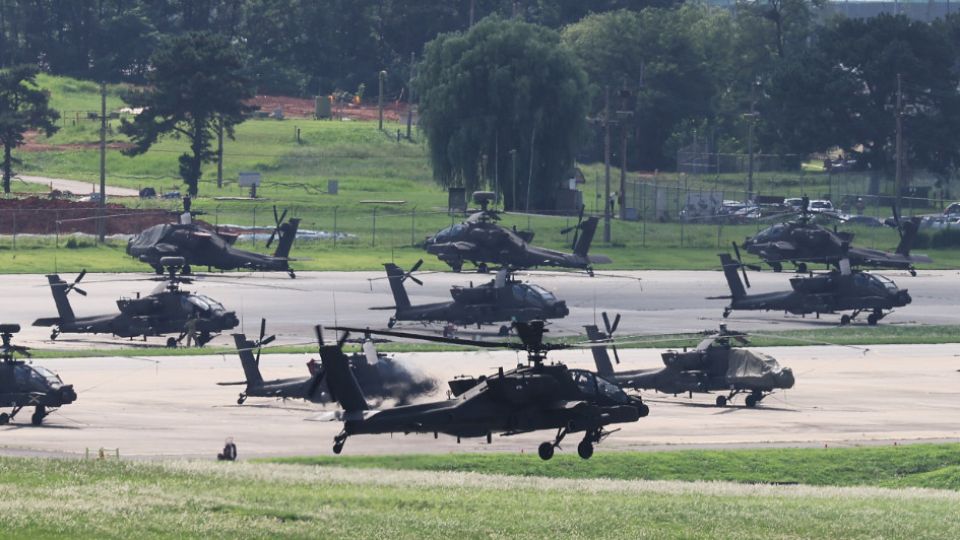August 17, 2022
SEOUL – South Korea and the United States on Tuesday kicked off preliminary military drills in the run-up to revived large-scale military exercises while holding high-level defense talks on the alliance’s deterrence and readiness against North Korean missile and nuclear threats.
The crisis management exercises led by South Korea’s Joint Chiefs of Staff are scheduled to be conducted for four days, according to the South Korean military.
The drills aim to practice and master procedures to manage crisis scenarios and respond to major threats to national security so as to prevent the crises from developing into a war.
Revival of large-scale exercises
South Korea and the US are set to begin large-scale combined military exercises, newly dubbed Ulchi Freedom Shield, from Aug. 22 to Sept. 1, South Korea’s JCS announced Tuesday.
Seoul and Washington have conspicuously decided to bring back the large-scale combined military exercises that have been suspended in the aftermath of then-US President Donald Trump’s commitment at the first US-North Korea summit in June 2018.
The JCS underlined that the forthcoming military exercises are “defensive in nature and staged annually so as to maintain the combined defense posture.”
“Our military will affirm the robustness of the South Korea-US alliance and fundamentally reinforce the combined defense posture by normalizing the South Korea-US combined military exercises and training that have been scaled down and adjusted for a considerable period,” according to the JCS.
The South Korea and US military will conduct various “tactical and practical” field training exercises, or FTXs, at each level during Ulchi Freedom Shield.
A total of 13 FTXs will be staged in connection with Ulchi Freedom Shield to “improve the combined operational capabilities of the South Korean and US military personnel.” The upcoming FTXs include brigade-level training involving a high-tech combat simulation system and battalion-level training for weapons of mass destruction elimination operations.
The South Korean and US militaries seek to enhance the linkage between annual large-scale joint drills and field training exercises that had been conducted sporadically throughout the year since 2019.
Both sides can “maximize the results of the training and demonstrate the strong South Korea-US alliance internally and externally” by staging field training exercises based on operational plans that also apply to Ulchi Freedom Shield, according to the JCS.
But Ulchi Freedom Shield comes as South Korean Defense Minister Lee Jong-sup last week repeatedly warned of the possibility of “North Korea making provocations” on the occasion of the military exercises.
South Korea’s Defense Ministry said North Korea prepares for launching a Hwasong-17 intercontinental ballistic missile during a briefing to the National Assembly on Aug. 1. The military also reportedly views North Korea as gearing up to fire various types of ballistic missiles in multiple areas.
High-level defense talks
Two days of high-level defense talks between South Korean and US senior defense officials began Tuesday to discuss a wide range of alliance issues including the US extended deterrence and combined defense readiness against North Korea’s escalating missile and nuclear threats.
South Korea’s Defense Ministry and the US Defense Department kicked off the 21st Korea-US Integrated Defense Dialogue, or KIDD, in Seoul with the participation of key defense and foreign affairs officials.
Deputy Minister for National Defense Policy Heo Tae-keun is leading the South Korean delegation for the first time since his appointment earlier this month. Siddharth Mohandas, US deputy assistant secretary of defense for East Asia, represents the US side.
Seoul and Washington were set to discuss pending issues such as the alliance’s deterrence efforts against North Korean threats as well as coordination on North Korea policy, defense science and technology, the arms industry, outer space and cybersecurity, a senior defense official — who asked to remain anonymous — said Friday during a closed-door briefing.
The two would also put their heads together to figure out how to enhance the viability of the US extended deterrence and deploy US strategic assets on the Korean Peninsula. Both sides would discuss the reactivation of the vice ministerial-level Extended Deterrence Strategy and Consultation Group and the potential agenda for the upcoming EDSCG meeting tentatively scheduled for September.
Other topics for discussion include the envisioned transfer of wartime operational control, or OPCON. South Korea and the US plan to conduct an assessment of the South Korean military’s Full Operational Capability during the forthcoming Ulchi Freedom Shield. The FOC assessment is the second part of the three-phase system required to transfer wartime OPCON to South Korea.
KIDD would also cover the trilateral security coordination among South Korea, the US and Japan.
Trilateral missile defense drill
Meanwhile, South Korea, the US and Japan conducted a ballistic missile defense drill during the multilateral Pacific Dragon exercise this month, South Korea’s Defense Ministry said Tuesday, without sharing the exact date.
The Pacific Dragon air and missile defense exercise were staged from Aug. 8 through Sunday off the coast of the Pacific Missile Range Facility in Hawaii. The navies of five countries — South Korea, Australia, Canada, Japan and the US –participated in Pacific Dragon.
During Pacific Dragon, the South Korean and US navies and Japan Maritime Self-Defense Force staged a missile warning and ballistic missile search and tracking exercise.
The South Korean, US and Japanese militaries “shared tactical data link information in accordance with a trilateral information sharing agreement.” The agreement was signed by the three countries in December 2014 to share classified information on North Korea’s nuclear and missile programs.
The trilateral missile defense exercise was conducted as a follow-up measure to the agreement by the South Korean, US and Japanese defense chiefs at the in-person meeting on June 11 in Singapore, according to South Korea’s Defense Ministry.
“South Korea, the US and Japan reaffirmed the commitment to advancing trilateral security cooperation to respond to challenges by North Korea, protecting shared security and prosperity and maintaining the rules-based international order.”


